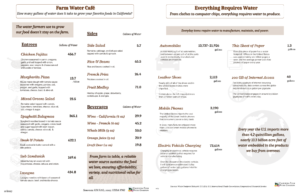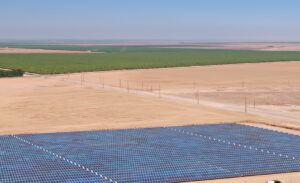Recent fish surveys confirm what many biologists, ecologists, and water experts have known for some time – Delta smelt remain on the brink of extinction. Zero Delta smelt were found in the California Department of Fish and Wildlife’s recent Fall Midwater Trawl Survey. Even the Enhanced Delta Smelt Monitoring Program, which is specifically designed to capture the tiny fish, only successfully caught two Delta smelt from September 8 to December 11, 2020.
Improving the health of native species like Delta smelt is an imperative, as it is critical to the health of our environment and the reliability of our water supplies. As an indicator species, the Delta smelt’s absence tells a grim story about the health of the Delta ecosystem, making these recent findings all the more concerning.
These results are not surprising, when California has made slow progress on actions like habitat restoration that are essential to restoring native fish populations.

For many years flows, meaning pumping from the Delta, have been blamed as the primary cause for the decline in Delta smelt. As a result, restrictions on pumping from the Delta have been the default approach to protecting these fish.
The fact that Delta smelt populations are still desperately low – despite years of restricted pumping – confirms that a flows-only approach isn’t effectively protecting Delta smelt populations.
Equally concerning is the fact that a flows only approach has at the same time had a detrimental impact on the agriculture industry and the communities that rely on surface water, not only in the Central Valley but for anyone who buys and eats food grown there.
In fact, there are a multitude of stressors on native fish populations – including invasive and predatory non-native species, loss of habitat, contaminants, and changes in food availability and quality – and restoring the health of Delta smelt requires a broad-based approach that includes targeted actions to effectively address all these factors.
Let’s use another analogy: Responding to the near-extinction of Delta smelt by relying on pumping restrictions alone is as effective in restoring their overall health as responding to the COVID-19 pandemic by relying on bar and restaurant restrictions alone. Can some data-based restrictions be a lever for change? Absolutely. But aggressive, austere restrictions that are not supported by the science cannot be relied upon to solve the entirety of the crisis – particularly when there are severe economic consequences associated with the restrictions, too.
Ultimately, we must pursue a combination of functional flow and non-flow measures, including habitat restoration and adaptive management, to meet the needs of native fish and wildlife species. Without a more holistic approach, the Delta smelt will go from endangered to extinct.



